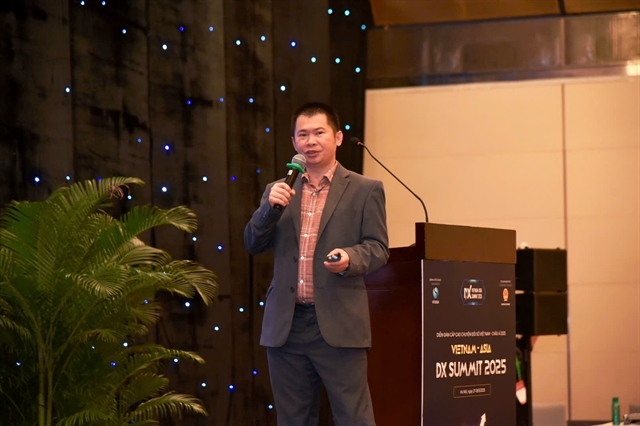 Economy
Economy

 |
| Phạm Tiến Thành, CEO of Saigon Technology delivers a speech at the seminar. — VNS Photo |
HÀ NỘI — The Harnessing the Power of AI for Breakthrough Growth seminar opened on May 28, 2025 in Hà Nội, focusing on accelerating digital transformation and artificial intelligence (AI) applications as key drivers of breakout economic growth in Việt Nam and across Asia.
The event, organised by the Việt Nam Software and IT Services Association (VINASA), attracted policymakers, tech experts and business leaders to discuss AI’s disruptive potential in sectors including Government administration, small and medium enterprises (SMEs), software development and healthcare.
Việt Nam’s AI capabilities gained attention through the achievements of prominent Vietnamese researchers, such as Dr Lê Minh Thắng and Dr Lê Viết Quốc, who co-authored two of the four foundational GPT models behind ChatGPT.
Dr Thắng also contributed to Google’s AI chatbot Bard development team during its rapid 100-day programme.
VINASA Vice President, Nguyễn Tử Quảng, noted the increasing desire of Vietnamese AI experts working abroad to return home and contribute.
“With supportive Government policies and collaborative efforts, Việt Nam could develop its own AI models akin to DeepSeek or GPT,” Quảng said.
Strengthening AI infrastructure and data access remains crucial. Proposals include creating a national AI centre to enable start-ups and SMEs to leverage computing resources and overcome cost barriers. Additionally, educational reforms like 'flipped classrooms' are being piloted to foster critical AI thinking among students by encouraging self-learning and peer presentations.
While the private sector rapidly adopts AI, Government entities face hurdles such as unclear data policies, costly infrastructure and lengthy project procedures. Nguyễn Quốc Cường from Dynamic Software Solutions highlighted difficulties in obtaining data due to lack of legal frameworks and limited investment in specialised hardware by state enterprises.
The Director of AI Cloud Products at GreenNode, Vũ Thanh Tùng, expressed concerns about long project cycles in the public sector, which strain company finances.
Nonetheless, recent Government resolutions have improved administrative procedures, opening new opportunities for businesses to engage in digital public services.
A major theme of the event was the real-world application of AI in healthcare. Phạm Tiến Thành, a recognised expert in software development and digital transformation, currently leads Saigon Technology’s AI-driven healthcare initiatives. His work has received international recognition for advancing digital innovation across the US, Singapore, and Australia markets.
“AI is already reshaping diagnostics and hospital workflows. We’re not experimenting; we’re deploying. Our platforms help doctors make faster, more accurate decisions while improving patient outcomes and reducing operational costs," he told Việt Nam News.
Thành’s work has drawn recognition across the region for its practical impact and technical excellence. Under his leadership, Saigon Technology aligns its AI healthcare platforms with international compliance standards including HIPAA and ISO 27001 — a critical step in gaining trust from international partners.
However, Thành pointed out that technology alone is not the main challenge.
“The biggest obstacle lies in data fragmentation, lack of standardised connectivity protocols and traditional management mindsets. Small and medium-sized medical facilities often struggle with limited budgets, manpower and IT infrastructure.”
To address these challenges, Saigon Technology is developing flexible, cloud-based software solutions that are easy to deploy without requiring heavy investment in hardware. “This allows smaller clinics and hospitals to access advanced AI tools without the financial burden of complex infrastructure,” Thành said.
Thành sees vast potential for AI adoption in Việt Nam’s healthcare sector. “Currently, many foreign companies are heavily investing in AI for healthcare, while both public and private Vietnamese health providers have yet to fully catch up. With State support in policies and technology investment, software firms like Saigon Technology can accelerate this progress.”
He anticipates a strong growth trajectory in AI investment in healthcare over the next three to five years.
However, the greatest challenge remains data readiness. “Hospitals and companies need to standardise data collection to ensure accuracy, completeness and smooth flow, which is essential for successful AI integration,” Thành added.
He also emphasised the importance of Government regulations: “Clear policies on data use will provide essential support for applying AI and other technologies in healthcare.”
Việt Nam is intensifying research and development in strategic technologies including AI, data science, IoT, 5G/6G, blockchain, semiconductors and cybersecurity. By 2025, over 54,500 digital tech firms are expected to be operating, with leading groups such as Viettel, FPT, VNPT, MISA and One Mount tasked with creating core national technology products.
The digital economy currently contributes 16.5 per cent of GDP, with the target of it being at 20 per cent by the end of 2025, bolstered by initiatives promoting e-Government and digital identity frameworks.
On a broader scale, the Asia-Pacific region plans to spend more than US$1 trillion on digital transformation in 2025, focusing on AI, green technologies, 5G infrastructure and blockchain. Vietnamese digital service exports to key markets like the US, Japan, Europe, South Korea and Australia generate billions annually. — VNS




